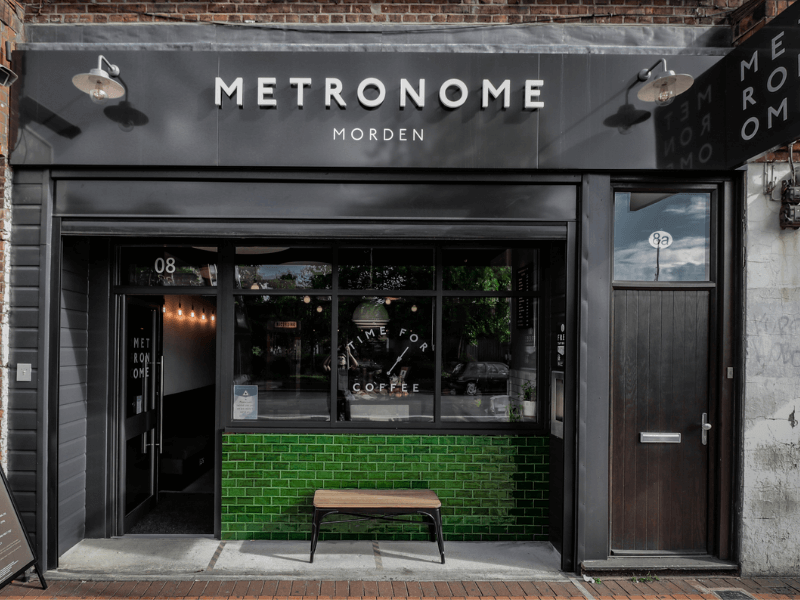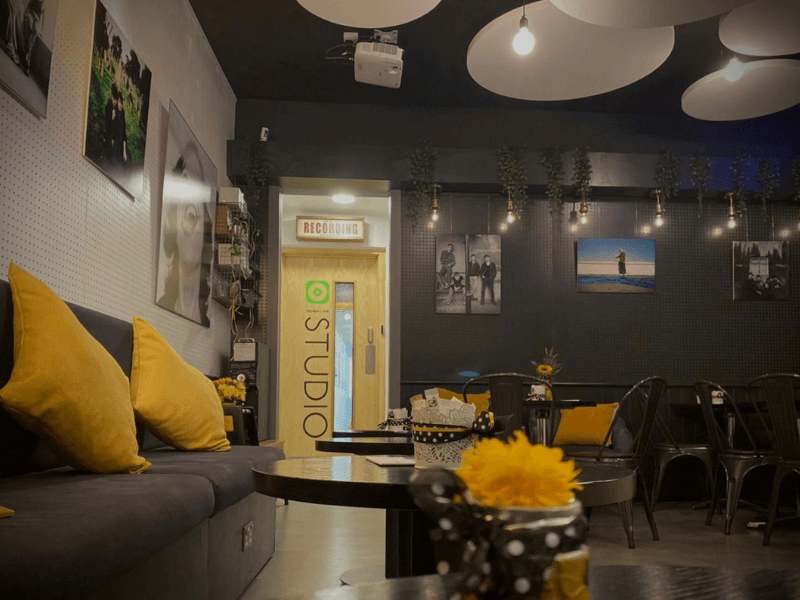Sometimes in life we make mistakes. How we respond to these awkward moments in life can often be the difference between barrier building - and positive change.
That was the key moment for me, when I realised a decade ago, that my inadvertent exclusion of someone at the studio could become the ignition needed - to fight for change.
And so it began. The journey to becoming the most accessible recording studio we could create.
In the process, one thing I’ve learnt is that I hate barriers. I really hate barriers. This is a mission we are all on, to remove obstacles - for everyone. Being an accessible business is an ongoing journey - not a destination. We’ve still so much to learn. But what have we done so far?
Today’s adventure
My recent barrier to contend with has been getting a hoist installed in our accessible toilet; opening the door to many people who would otherwise be excluded.
The cost (being ineligible for grants), was ludicrously prohibitive for a small business like mine, so I had to get creative. I received various quotes (still far too high) until one provider suggested they installed a reconditioned hoist. Sadly, it was still too high. So we thought laterally and started a crowdfunder.
Wow. The buy-in and subsequent coverage of the campaign for accessible businesses in music has been huge. We’re set to have the hoist installed this Spring. Barrier smashed.
 "So together, let's keep our panorama wide, understand where we’re starting from and the realities of our various situations and locations - then dream big". Image credit: John Merriman.
"So together, let's keep our panorama wide, understand where we’re starting from and the realities of our various situations and locations - then dream big". Image credit: John Merriman.
Yesterday’s adventure
Once we’ve formed friendships with clients, I often ask "are there any barriers we can remove?". Answers to this question have resulted in many of the recent changes - including the hoist. Here are a few other changes we’ve made in direct response to barriers we’ve been made aware of over recent months:
- Pedal Bin in the accessible toilet (foot operation being totally impractical for many clients). We purchased a motion-sensor operated bin.
- Door stops (a trip/wheel hazard in narrow corridors). We replaced them with magnetic door catches.
- Audible-only standard emergency/fire alarms (ineffective if hearing impaired). We installed red flashing warning lights wired in every room, in addition to the standard alarm.
- Standard height studio window through to the Live Room (impossible for sight-lines if in a wheelchair). We raised the floor in the Live Room and increased the window size.
- Car park accessible ramp blocked by cars despite signs (also blocking the emergency exit for wheelchair users). We purchased retractable belt barriers on posts positioned to maintain wheelchair access - whilst restricting vehicles.
 "It can be daunting setting out making your project more accessible...but starting right, will mean journeying well". Image credit: John Merriman.
"It can be daunting setting out making your project more accessible...but starting right, will mean journeying well". Image credit: John Merriman.
Tomorrow’s adventure
It can be daunting setting out making your project more accessible. So much confusing legislation; so much conflicting information; so many priorities shouting for your attention. But starting right, will mean journeying well. Starting right means preparing your thinking and opening your mind to others' lived experiences. Starting right means ignoring the latest knee-jerk campaign, and focusing on the long term changes for your business.
If all of this sounds like too much to start with, here are some small changes that will make a world of difference.
Small change #1- know the law
From how people should apply for jobs with you, what ‘reasonable adjustment’ is, through to knowing what questions you can and can’t ask is all covered.
Two key important acts to have read are the Equality Act 2010 and the United Nations Convention on Disability Rights. There is an easy read version of the Equality Act which is a helpful overview and a very good starting point to help understand what equality looks like according to the law.
Small change #2 - read
Reading books and blogs written in response to first hand experiences by people living with disabilities will help us all better understand which barriers are most important to address, and which might be less of a priority. There are many excellent books, but two to get you started are Disability Visibility (Wong, A. 2020) and Incurably Human (Mason, M. 2000). These both allow us to perceive the world through others’ experiences.
Be ready to have your preconceptions challenged and your creativity awakened.
Some creative ideas not in the book but triggered by what I’ve read include: building a model of the studio complex out of lego so visually impaired users can be a part of the planning of recording sessions. This idea came from a theatre story in Disability Visibility, where a scale model of the stage was given to each visually impaired audience member to run their fingers over throughout the play to contextualise the action.
What is an Access Rider?
An access rider is a document that details musicians’ access needs. Access riders are used by disabled artists to ensure that their access needs are met so they can do their job.
Read more about Access Riders
Small change #3 - consult the experts
Sometimes the short-term cheaper option is not always the best option.
When we first put our toilet in the studio we didn’t really consider accessibility at all. Within a couple of years, we were ripping out the toilet and rebuilding a much larger fully compliant accessible toilet. Having the accessible toilet has opened the doors to so many more users, but I wish we’d listened to the experts at the start.
Our architect had a huge passion for access and has worked tirelessly to design spaces without barriers - and with beautiful design - something that we have tried to continue. For example, our signage is not just compliant in its size and positioning, it’s classy and is better for all users of the studio. No one would know it’s also part of our dementia friendly initiative.
Are you a disabled musician?
Join our Disabled Musician Network for members. Network members receive regular updates on our equalities work via newsletters, as well as the opportunity to contribute to MU consultation responses and take part in surveys.
Join our Disabled Musician Network for members
Small Change #4 - meet your users and potential users
Listen to the voices of your users. Create a safe context where questions can be asked.
We’ve developed a clear section on our website, similar to an access rider, which gives clients more information but also the opportunity to ‘just ask’ about anything that could make their session easier. We’re also pretty public on our social media that access is important to us.
Small change #5 - keep your vista large
When we set out on this journey we had no idea where it would lead. But here we are, running public campaigns, changing our pricing structure, sharing experiences and even writing blogs.
Today in the studio, two independent bookings both included members for whom without our modifications which have come about as a result of this journey, wouldn’t have been here at all. One was rehearsing for an ITV prime time TV show; the other, recording a BBC radio 3 drama.
Final thoughts
So together, let's keep our panorama wide, understand where we’re starting from and the realities of our various situations and locations - then dream big - and together we can not only remove barriers but experience artforms from people who have previously been silenced.
Visit Crown Lane Studio’s site for more information on its crowd-funder campaign ‘Spend a penny’.
Update: since writing the blog, Crown Lane Studio has reached its £3,000 target to get a hoist installed – and it’s already made a difference to musicians who would otherwise have been unable to access the studio.
MU membership for disabled musicians
If you are a disabled musician facing financial barriers, you can benefit from a reduced MU membership rate.
Read more here